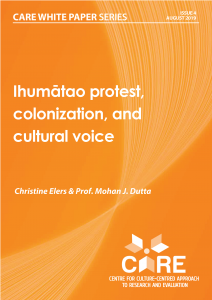by Christine Elers & Prof. Mohan J. Dutta , Center for Culture-centered Approach to Research and Evaluation (CARE)
The erasure of indigenous voice goes hand-in-hand with the occupation of indigenous land. What we witness over the past seven years at Ihumātao, as an extension of over a century of colonialism in Aotearoa, is the deployment of colonial tactics to erase and silence the voices of indigenous Māori peoples. Through a variety of tactics the controls over which are held by the colonizers, Māori voices resisting colonialism are silenced. The very uses of communicative strategies of indigenous participation are deployed in logics established by the colonizer to prop up and perpetuate the colonial-capitalist structure, with the state making claims to having created opportunities for participation. The capitalist interests, served through naturalized logics of the market, reflect the oppressive nature of colonialism, all the while working to erase through the very performance of tools of participation and engagement. In this backdrop, drawing from the ongoing protests at Ihumātao, in this white paper, we attend to the organizing role of indigenous voice as the basis for dismantling colonial capitalism. The Māori voice of resistance in Ihumātao, resounds with indigenous voices in Hawaii, who are protecting their sacred land – Mauna Kea from the construction and intrusion of a giant telescope on the summit. Elsewhere across the globe the plurivocality of resistance offer pathways for addressing the very challenges that have been brought on by the accelerated corporate-colonialism of neoliberal governmentality.

